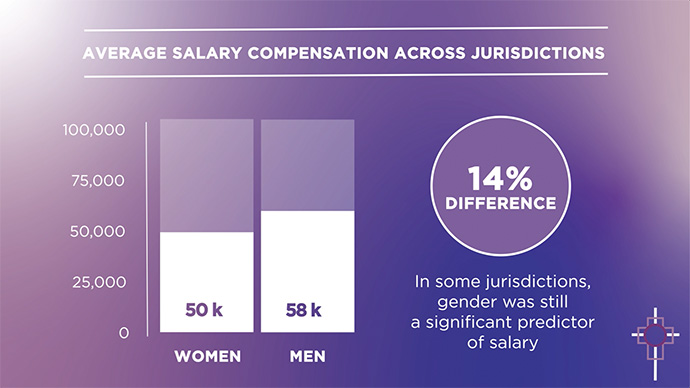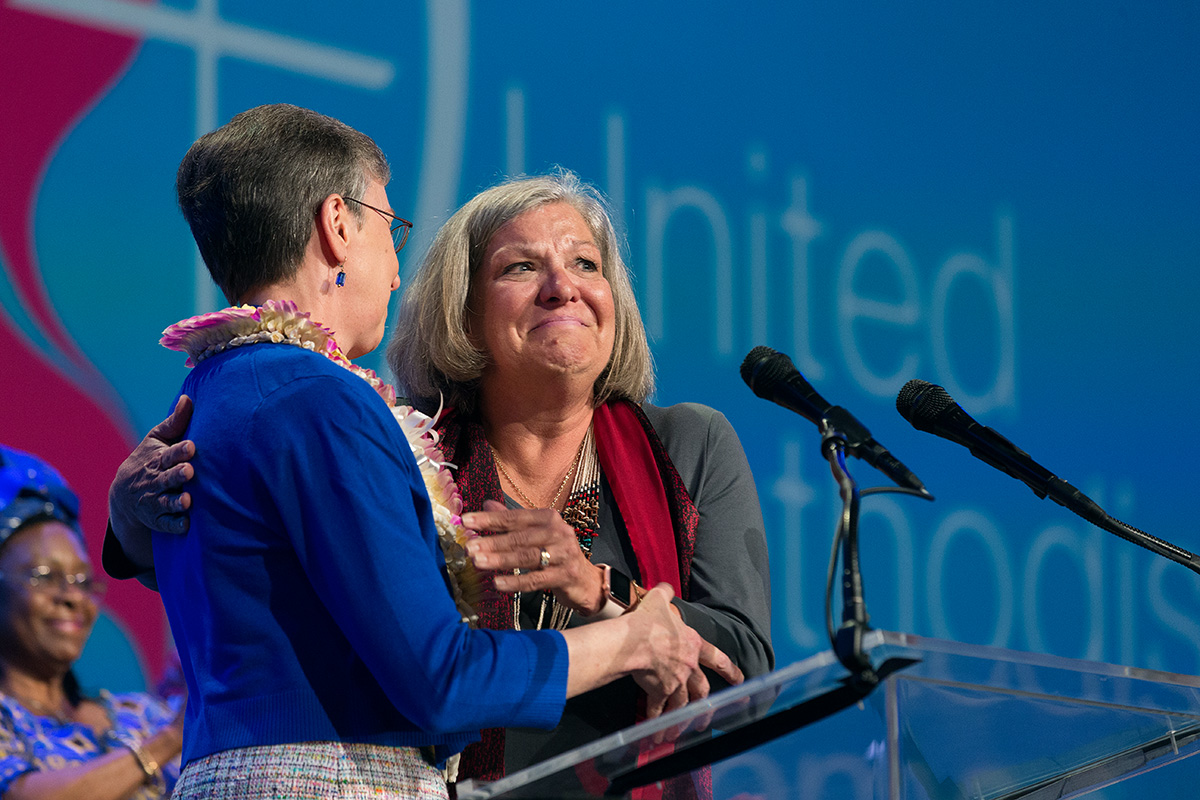Key points:
- The United Methodist Commission on the Status and Role of Women is celebrating its 50th anniversary this year.
- Strides have been made, but the church still is behind on issues such as salary disparities between men and women clergy.
- Many churches still resist the appointment of a female pastor.
Resistance to the appointment of a female pastor is still common, and remains one of the signature issues of the United Methodist Commission on the Status and Role of Women as it marks its 50th anniversary.
“It's the honest truth,” said Dawn Wiggins Hare, the top executive of the commission. “We all have friends who are bishops and we all have friends who are district superintendents, and they're the ones making these appointments.”
Every appointment season, those friends have questions and requests for advice.
“They reach out and say, ‘I am having such pushback; can you give me some help here?’” Hare said.
It could be a tough thing to acknowledge while celebrating such a significant anniversary of the commission charged with advocating for the full participation of women in The United Methodist Church.
Hare chooses to accentuate the positive.
“We actually rolled out a resource called ‘Welcoming a Woman Pastor,’ which is an interactive resource on our website,” she said. “It is a video and interactive series about how you can prepare a welcoming environment for women clergy.”
Hare is a former circuit court judge in Alabama who began leading the commission in 2013.
“We want to model what inclusivity looks like,” she said. “Every person is created in the image of God, which includes women.”
Raised in Brewton, Alabama, Hare graduated from the University of Alabama School of Law and worked in Pensacola, Florida, before returning to Alabama to practice law with her husband, Nicholas Stallworth Hare.
She served as a judge for six years in the 35th Judicial Circuit in Monroeville before moving to her current post.
She had “always been active” in First United Methodist Church in Monroeville and in the district and annual conference, she said. She also has served as a delegate to General Conference and jurisdictional conferences.
In the Alabama-West Florida Conference, Hare was a member of the local Commission on the Status and Role of Women. In 2012, she was honored with that group’s Alice Lee Award for her service to the church and for helping break down barriers for women. Hare chaired the task force that developed the conference’s policy on clergy sexual misconduct and served as a trainer of that policy in the conference.

Hare agreed to answer some questions for United Methodist News to mark the 50th anniversary of the commission.
How do you feel about the commission as it celebrates this milestone?
I see this as a time of just so much to be done. But every once in a while, we need to stop and turn around and say, “But look how much has been accomplished.” We don’t want everybody to sit and beat themselves up so much because it can be overwhelming. The general commission began with just a couple people in a borrowed office at Garrett-Evangelical (Theological Seminary). (It) was born when a group of clergywomen got together before General Conference to say, “There is widespread discrimination across the church against women. What can we do about this?”
It must have been heartening that seven of 13 new bishops elected at the jurisdictional conferences were women.
These elections occurred in the United States and they are indeed a time for hope. I believe that it is too soon to celebrate representation across the connection as additional elections are taking place this year. There is only one woman serving across our central conferences, meaning we have much to do to seek full inclusion in the UMC. We challenge the church to include women, clergy and lay at all levels of leadership in the church as that models conduct and our witness to the church and to the world. (Editor's Note: Since this conversation with Hare, the Philippines Central Conference elected Bishop Ruby-Nell M. Estrella, its first female bishop.)
I know you prefer the carrot to the stick, but are there times when you have to be tougher than that?
Our philosophy has been to try to acknowledge good behavior, thinking that rewarding good behavior will incentivize more of it. But if there is egregious behavior, there's a point when you have to name it. So there are times when you just have to say, “This is unacceptable.”
Women pastors in The United Methodist Church make about 14% less than men. That seems like something that would be easy to remedy, but apparently it's not. Is that because men get assigned the larger churches, and therefore the larger salaries?
I think that is what it boils down to. And I think sometimes the gains we've seen, I'm not sure that they're not skewed because some of the offset is that we do have bishops who have made good strides in intentionally appointing women to district superintendent’s positions, which are some of the largest salaries. It has been hypothesized that if you look at just appointed clergy, the disparity would be greater. That might be our next study.
Do you deal with mostly outright sexism against women, or is it more complex than that?
It is definitely more complex than outright sexism against women. You have people who grew up in different faith groups that justify their sexism through interpretations of Scripture that they were taught without stopping to question the accuracy of the interpretation. There is also straight-up sexism where those in power use theology or biblical language to support their claims to power and to perpetuate sexist views, totally ignoring experience, reason and interpretation. In other words, they know better. You also have intersectionality where racism and sexism are combined to undermine women in leadership at multiple angles.
Bringing race in as another corresponding issue must really complicate things.
It certainly adds another level of obvious discrimination. It's hard to separate out the data because all the categories are not always delineated when you're getting reports and information from different sources. There are definitely levels of privilege and levels of discrimination. I mean, African American women, Hispanic women and Asian women, they definitely have the hardest goes in the church. There's no doubt about that.
Is there a particular area where we urgently need more progress when it comes to women being represented in the church?
We still do not have equitable representation as delegates to General Conference. The United Methodist Church is made up of about 68% women, and we are 35 to 36% of delegates to General Conference. We're just not there yet. … On the other hand, there weren't any women bishops in 1972, when the general commission (started). There were no women clergy delegates to General Conference in 1972. That didn't happen until 1976. Then you had your first woman bishop elected in 1980. So those changes, the General Commission on the Status and Role of Women may not be responsible for them, but they happened on our watch. I like to think that we have had something to do with those changes along the way for more inclusivity.
Are there times when a qualified man should simply step away from a church position or being considered for it so a woman can have that opportunity?
The answer is “yes” when there is a qualified woman who should be given an opportunity. Stepping aside does not just go for men. It also goes for women who are in positions of leadership, especially white women. There are times when we have to share our platforms with qualified younger women and qualified women of color who have not benefited from the privilege that has been given to us. Across the church, there are times when persons in leadership positions have to set aside our personal egos to be more like Christ in the ministries that we are leading and in the work we are modeling, and make room for a different voice at the table. That is how we grow young leaders at a table that represents the world as our parish.
Is the day coming where there isn’t a need for an organization like GCSRW?
I will celebrate the day when there is no work for our agency to do because there is equality and equity across the church, but I do not see that in the near horizon. But all things are possible with Christ. So we'll see.
Patterson is a UM News reporter in Nashville, Tennessee. Contact him at 615-742-5470 or [email protected]. To read more United Methodist news, subscribe to the free Daily or Weekly Digests.
Watch video




